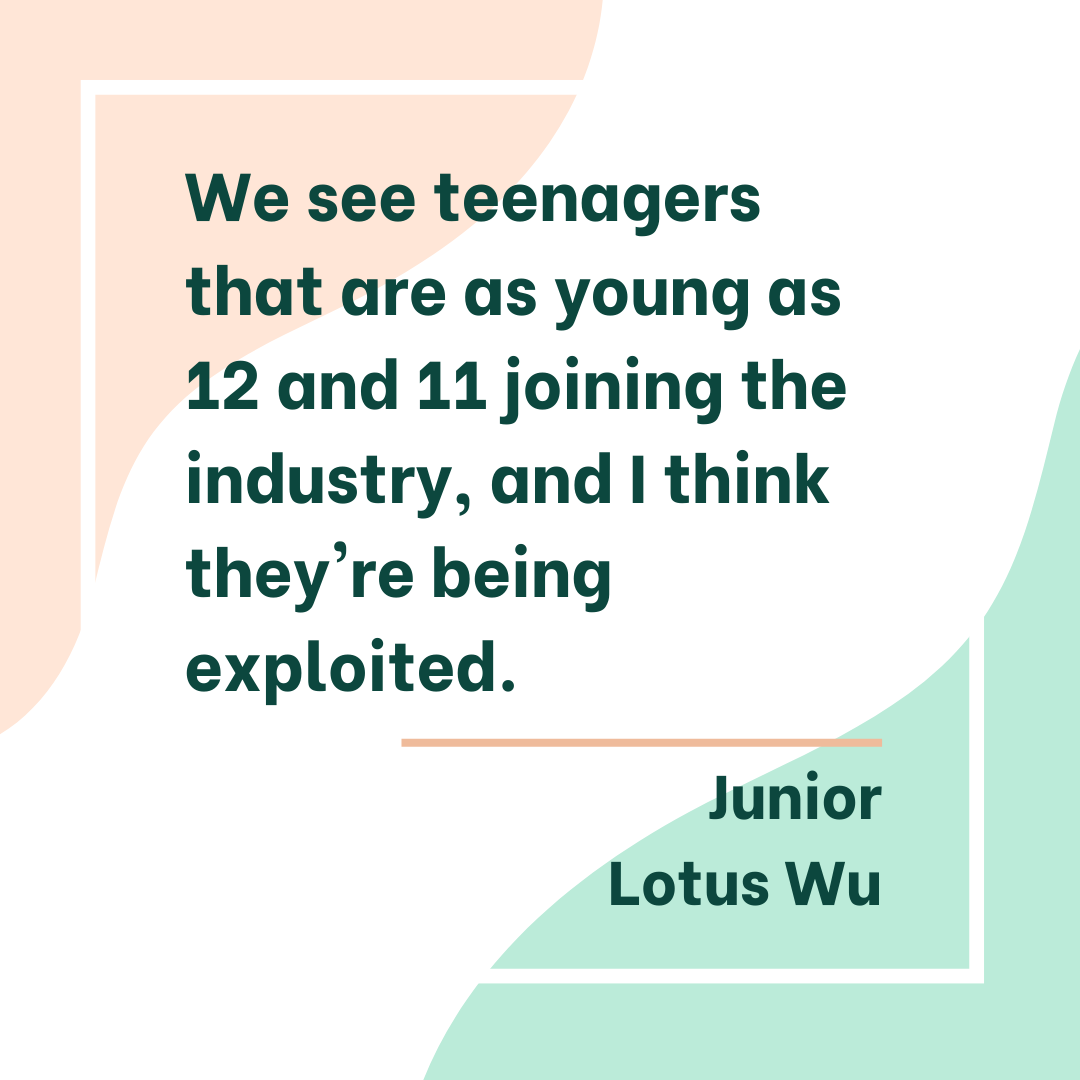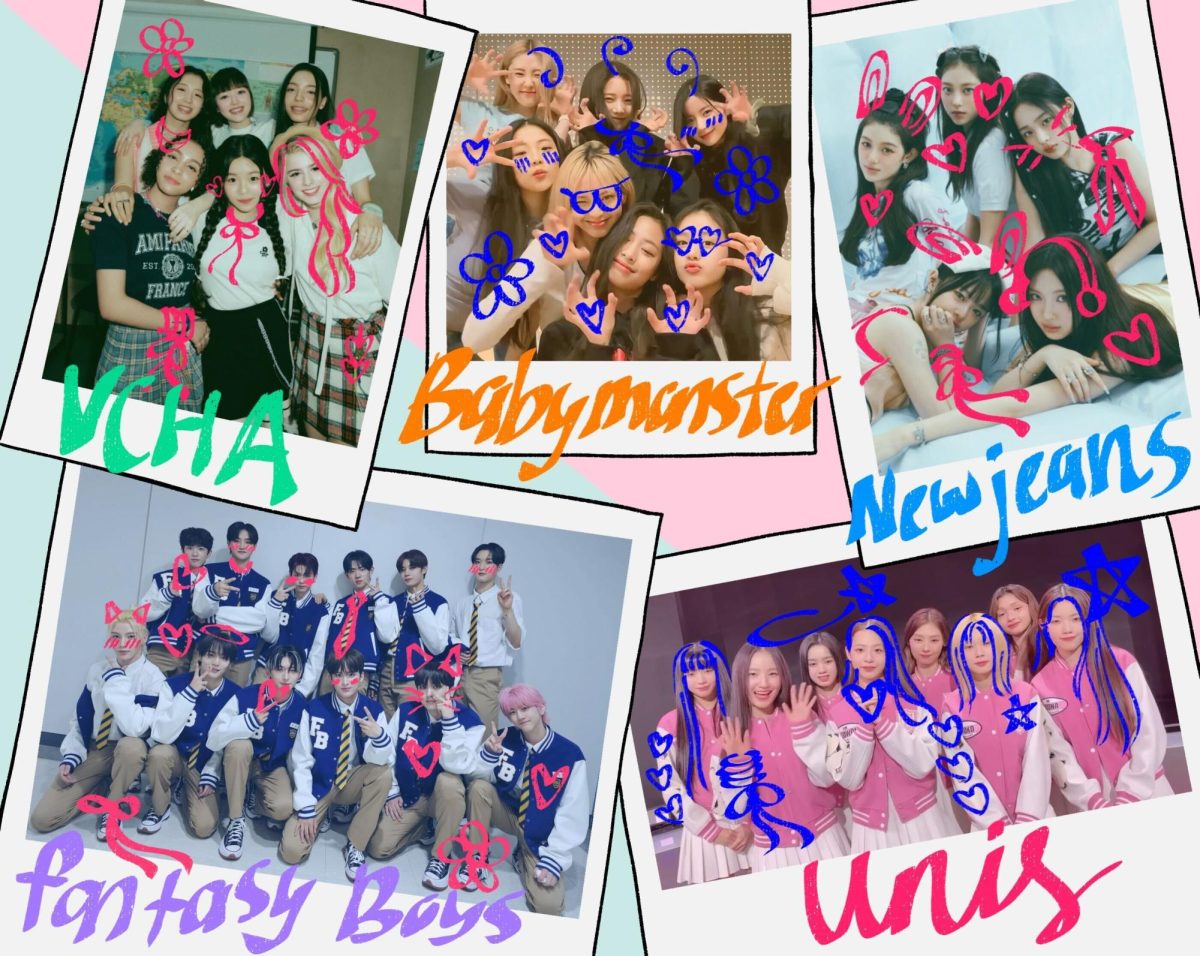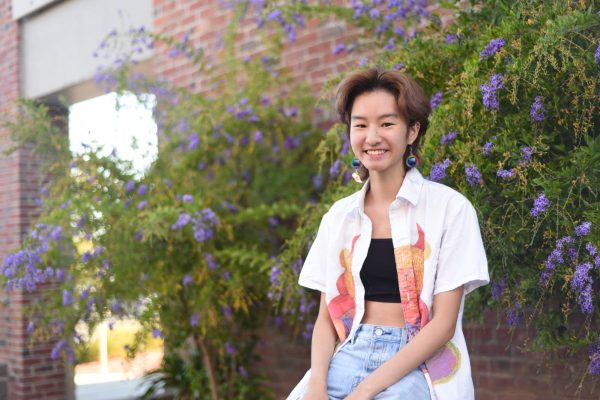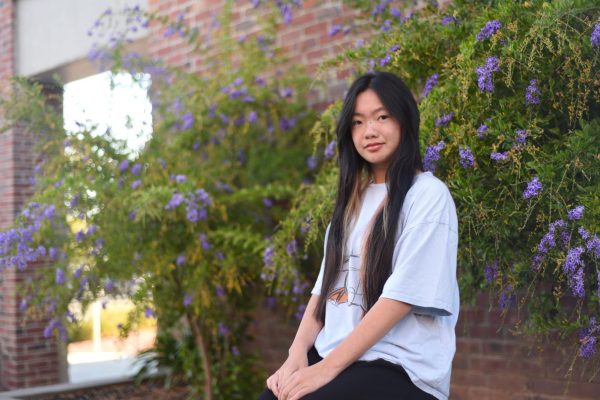Even through the screen of her phone, junior Lotus Wu could see the passion and commitment put into the idols’ performances. Ever since sixth grade, Wu has been captivated by their energy and the way their presence commands the stage. As a dancer and performer herself, she has always held a deep admiration for how idols in the K-pop industry perform, dancing and singing simultaneously.
Before long, Wu found herself immersed in the realm of K-pop. As a fan for many years, she has witnessed the industry change in many ways, both good and bad, but she is particularly concerned with the younger age at which idols are debuting. She brings up NewJeans in specific, whose youngest member debuted at 14 years old and is currently 15.

“I was really shocked that they are allowing this to happen because I feel like in older K-pop, we’ve seen mature content as K-pop is meant for older audiences,” Wu said. “But now, we see teenagers that are as young as 12 and 11 joining the industry, and I think they’re being exploited.”
The entertainment industry has always been riddled with controversies, especially in relation to minors. The K-pop industry, worth millions of dollars, comes with its own set of struggles for performers.
In the K-pop fandom, the term “sasaeng” refers to fans who are overly obsessed and possessive of their idols. To Wu, exposing younger idols, who are less in control of their lives, to the potentially unsafe environment of media and fans is a harmful practice.
“Now, the fans want such a personal connection to these idols,” Wu said. “The idols are forced to interact with fans in personal ways, like fan calls and in-person fan meetings, and if fans don’t get this personal connection, then they’re less willing to interact with the group, or the group itself will be less popular.”
According to MVHS school-based psychologist and family therapist Glenn Fisher, becoming a public figure and star as a minor can cause issues in the child’s mindset, such as developing a sense of narcissism and superiority. In particular, the overwhelming attention child stars receive can put them in a situation that they’re not ready for, resulting in permanent changes to their mental state.
“So many factors contribute to the companies disregarding the emotional well-being of the idols,” Fisher said. “Who knows how much they get pressured by the media company, or how much they are pressured by their parents, and how much revolves around making money.”
Wu has noticed K-pop’s history of sexualizing both minor and adult idols with suggestive lyrics and dances. She expresses concern about the placement of teen idols alongside adult idols in groups, and how underage idols may be forced to do more mature choreographies by their company.
“When younger idols are paired with older idols, the concepts the older idols work with don’t necessarily fit with the younger idol’s age,” Wu said. “I think it’s wrong that younger idols have to be doing those things and wearing the clothes that they’re wearing. It’s less of an issue when you’re older versus when you’re 13 and you’re doing the same choreography.”
Another process that young idols might not be ready for is plastic surgery, which some companies require the to go through before debuting. Fisher compares getting surgery to getting a permanent tattoo at a young age, a choice that minors may not be psychologically ready for. He adds that when their public image is defined by their physical appearance, it can cultivate an unhealthy self-image.
“They get acknowledged for their physical appearance opposed to them as a whole, complete human being,” Fisher said. “They’re not recognized for who they are. They are recognized for their makeup and the Photoshopping and their bodies. It’s not an innately healthy thing for them because it would erode their self-worth.”
Fisher worries about how child stars may not have consented to the alterations in their appearance and life. Wu shares the same sentiment, stating while it is good to be dedicated to their career, the issue arises when idols undergo plastic surgery without explicit consent. Moreover, since K-pop targets younger audiences, the idols are ultimately influencing them.
“It’s toxic because a lot of the fans are younger people who are fighting this image that they have to be perfect,” Wu said. “A lot of people look at these K-pop idols as examples, and then having the idols have plastic surgery and changing their appearance just for the media is giving a toxic example.”
However, people in America and people in Korea experience two very different cultures. What may be the norm in Korea may not be in America, and vice versa. Wu, seeing discussions about K-pop on social media, comments how differently people from America and people from Korea can react to situations.
 “Because of social media, this issue is being shared more and I think more people are calling attention to it in America versus in Korea,” Wu said. “I feel like the fans in Korea, even though I haven’t interacted with them, care less about this issue than the fans in America do.”
“Because of social media, this issue is being shared more and I think more people are calling attention to it in America versus in Korea,” Wu said. “I feel like the fans in Korea, even though I haven’t interacted with them, care less about this issue than the fans in America do.”
Sophomore Jihwan Lee, a transfer student from Korea, observes that there are often mixed reactions to an idol getting plastic surgery in Korea. Many are supportive of their idol’s decisions, but there are also people who criticize it. Although Lee personally doesn’t agree with the practice, he recognizes how getting plastic surgery is more commonly accepted in Korea opposed to America.
“In Korea, the beauty standard is so important to them, so they try to be on that standard,” Lee said. “So there’s jealousy when the celebrities are pretty. People think ‘Oh, they’re pretty because of the surgery,’ and they try to make the idol’s image bad. But here in America, people like themselves more, and they try to be themselves more than people in Korea.”
Lee suggests that the reason the K-pop industry prefers younger idols is because they want performers with higher energy to engage the audience. Wu agrees, also adding how companies are adjusting their idols accordingly.
“When they are younger, it’s easier to train them the way the industry wants to,” Wu said. “It’s easier to shape them into the ‘ideal idol’ that you want to debut, and I think they choose that purposely to give them more opportunities and for them to make more money.”
As Wu reflects, the K-pop industry seeks talents who can attract a loyal following, showcasing people with exceptional singing ability, dance skills and charming personalities. She concedes that adapting the age of idols to match their audience is just another factor that the industry utilizes.
“I understand the incentives,” Wu said. “At the end of the day, it’s entertainment, but also a large source of profit for Korea and for the companies that are debuting these idols.”













